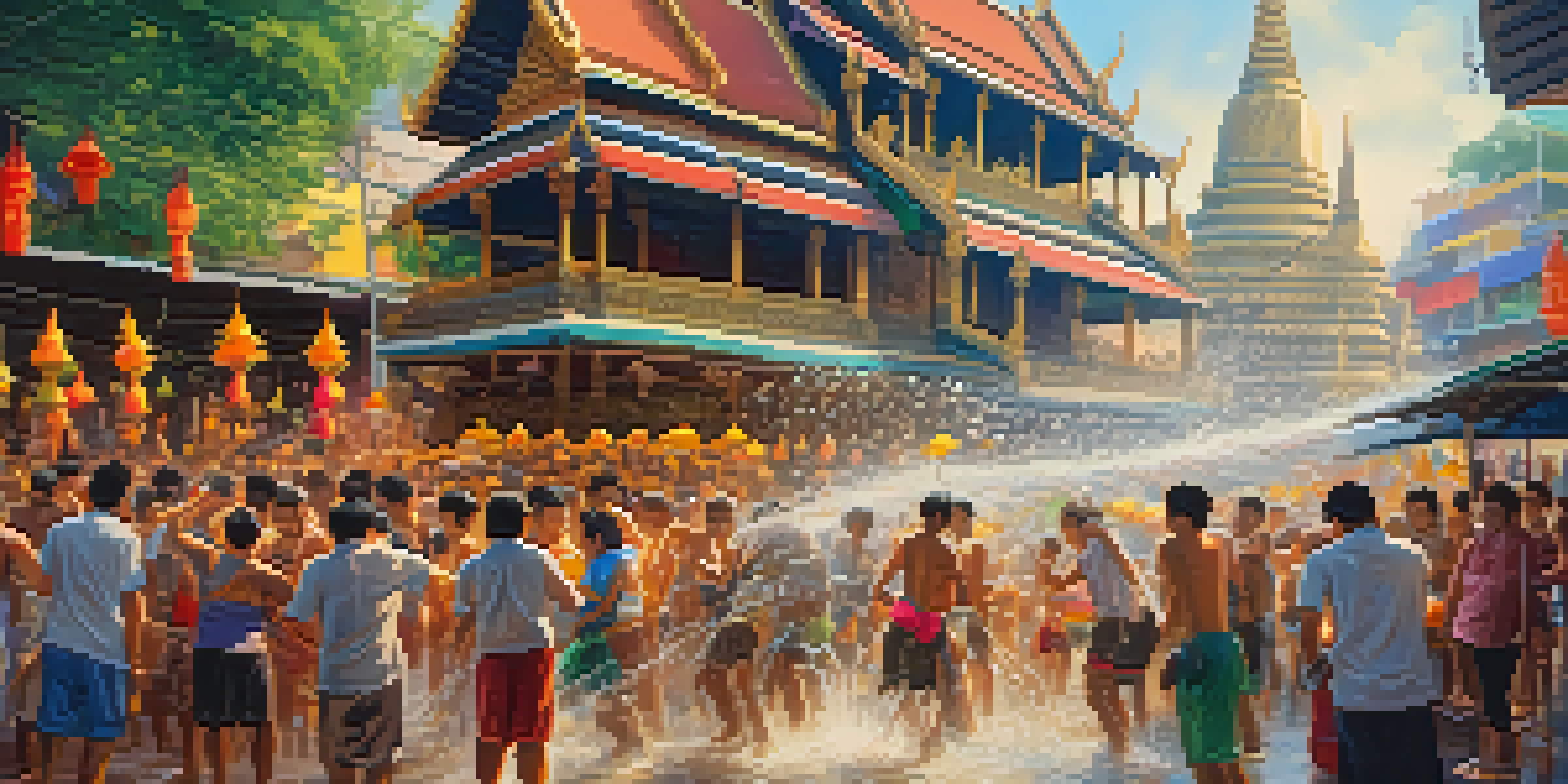The Role of Buddhism in Thai Festivals and Celebrations

Introduction to Buddhism's Role in Thai Culture
Buddhism is deeply woven into the fabric of Thai culture, influencing customs, traditions, and celebrations. The majority of Thais practice Theravada Buddhism, which shapes their worldview and communal life. Festivals in Thailand often reflect Buddhist teachings, symbolizing community, spirituality, and gratitude. Understanding this connection can enhance your appreciation for the richness of Thai celebrations.
Songkran: The Thai New Year and Water Festival
One of the most famous festivals in Thailand is Songkran, marking the Thai New Year in April. This celebration is rooted in Buddhist beliefs, where people pay respect to their elders and cleanse Buddha statues. The act of splashing water symbolizes purification and the washing away of sins from the past year. This festival beautifully blends fun and spirituality, making it a cherished event for locals and tourists alike.
Buddhism Shapes Thai Culture
Buddhism profoundly influences Thai customs, traditions, and festivals, enriching the spiritual and communal life of the people.
Loy Krathong: A Festival of Light and Reflection
Loy Krathong, celebrated on the full moon night of the 12th month, is another significant Thai festival. During this event, people create small floating baskets, or krathongs, and release them into rivers and lakes as a form of offering to the water spirits. This act symbolizes letting go of negativity and seeking forgiveness, reflecting core Buddhist values. The sight of thousands of lights on the water is a stunning reminder of hope and renewal.
Buddhist Lent: A Time for Reflection and Meditation
Buddhist Lent, known as 'Khao Phansa,' marks the beginning of the rainy season retreat for monks. This three-month period is dedicated to deepening spiritual practice, meditation, and study. During this time, many laypeople also engage in merit-making activities, such as donating to temples or participating in community service. This festival emphasizes the importance of mindfulness and commitment to spiritual growth.
Major Festivals Reflect Buddhist Values
Festivals like Songkran and Loy Krathong embody Buddhist teachings, emphasizing purification, reflection, and community spirit.
Makha Bucha: Honoring the Buddha's Teachings
Makha Bucha is celebrated on the full moon day of the third lunar month, honoring a significant event in Buddhism. It commemorates the Buddha's sermon to 1,250 enlightened monks, emphasizing the importance of ethical conduct and community. Thais participate in candlelit processions and ceremonies at temples, reinforcing their commitment to the Dharma. This festival serves as a reminder of the teachings that guide their daily lives.
Visakha Bucha: Celebrating the Buddha's Life
Visakha Bucha is an important festival that celebrates the birth, enlightenment, and passing of the Buddha. Observed on the full moon day of May, this day is marked by rituals, prayers, and offerings at temples. Many Thais engage in acts of kindness and generosity, reflecting on the Buddha's teachings. It's a day filled with spiritual significance, reminding everyone of the values of peace and compassion.
Spirituality in Thai Weddings
Buddhist rituals in Thai weddings symbolize unity and respect, highlighting the importance of spirituality in marital unions.
Buddhist Influence on Thai Wedding Ceremonies
Buddhist traditions also play a vital role in Thai weddings, where rituals symbolize unity and respect. Couples often seek blessings from monks, signifying the importance of spirituality in their union. Traditional ceremonies include the 'water pouring' ritual, representing the cleansing of past issues and the start of a new life together. This blend of cultural and spiritual elements makes Thai weddings unique and meaningful.
Conclusion: The Living Legacy of Buddhism in Thai Festivals
Buddhism's influence on Thai festivals and celebrations is profound, weaving together spirituality and community. These events not only serve as a reminder of religious teachings but also foster a sense of belonging among the people. As you explore Thailand, participating in these celebrations allows you to experience the vibrant culture deeply rooted in Buddhist values. Embracing these festivals can lead to a greater understanding of Thailand's rich heritage.